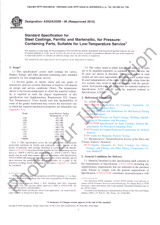Wir benötigen Ihre Einwilligung zur Verwendung der einzelnen Daten, damit Sie unter anderem Informationen zu Ihren Interessen einsehen können. Klicken Sie auf "OK", um Ihre Zustimmung zu erteilen.
ASTM D3675-22
Standard Test Method for Surface Flammability of Flexible Cellular Materials Using a Radiant Heat Energy Source
Name übersetzen
NORM herausgegeben am 15.3.2022
Informationen über die Norm:
Bezeichnung normen: ASTM D3675-22
Anmerkung: UNGÜLTIG
Ausgabedatum normen: 15.3.2022
SKU: NS-1051685
Zahl der Seiten: 11
Gewicht ca.: 33 g (0.07 Pfund)
Land: Amerikanische technische Norm
Kategorie: Technische Normen ASTM
Kategorie - ähnliche Normen:
Ignitability and burning behaviour of materials and productsCellular materials
Die Annotation des Normtextes ASTM D3675-22 :
Keywords:
beta factor, Is, radiant panel, radiant panel index, surface flammability,, ICS Number Code 13.220.40 (Ignitability and burning behaviour of materials and products),83.100 (Cellular materials)
Ergänzende Informationen
| Significance and Use | ||||||||||||||||
|
5.1?This test method is intended for use when measuring surface flammability of flexible cellular materials exposed to fire. The test method provides a laboratory test procedure for measuring and comparing the surface flammability of materials when exposed to a prescribed level of radiant heat energy. The test is conducted using specimens that are representative, to the extent possible, of the material or assembly being evaluated. For example, if an assembly is required to be tested, such specimens shall replicate the type and thickness of all the layers present in the assembly being evaluated. 5.2?The rate at which flames will travel along surfaces depends upon the physical and thermal properties of the material, product, or assembly under test, the specimen mounting method and orientation, the type and level of fire or heat exposure, the availability of air, and properties of the surrounding enclosure. (1-6)4, 5 5.3?Test Method E162 is a generic version of this test method, using an apparatus that is substantially the same as the one used in this test method. However, Test Method E162 is normally intended for application to specimens other than flexible cellular materials. 5.3.1?The pilot burner in this test method is different from the pilot burner in Test Method E162. 5.4?In this procedure, the specimens are subjected to one or more specific sets of laboratory fire test conditions. If different test conditions are substituted or the end-use conditions are changed, it is not always possible by or from this test to predict changes in the fire-test-response characteristics measured. Therefore, the results are valid only for the fire test exposure conditions described in this procedure. 5.5?If the test results obtained by this test method are to be considered as part of an overall assessment of fire hazard in a building or structure, then the criteria, concepts and procedures incorporated into Guide E1546 shall be taken into consideration. |
||||||||||||||||
| 1. Scope | ||||||||||||||||
|
1.1?This is a fire test response standard. 1.2?This test method describes the measurement of surface flammability of flexible cellular materials. 1.3?This standard measures and describes the response of materials, products, or assemblies to heat and flame under controlled conditions, but does not, by itself, incorporate all factors required for fire hazard or fire risk assessment of the materials, products, or assemblies under actual fire conditions. 1.4?This standard does not purport to address all of the safety concerns, if any, associated with its use. It is the responsibility of the user of this standard to establish appropriate safety, health, and environmental practices and determine the applicability of regulatory limitations prior to use. 1.5?Fire testing is inherently hazardous. Adequate safeguards for personnel and property shall be employed in conducting these tests. 1.6?Specific information about hazards is given in Section 7. Note 1:?There is no known ISO equivalent to this
standard.
1.7?The values stated in SI units are to be regarded as the standard. The values stated in inch-pound units, in parentheses, are for information only and are approximations (see also IEEE/ASTM SI-10). 1.8?This international standard was developed in accordance with internationally recognized principles on standardization established in the Decision on Principles for the Development of International Standards, Guides and Recommendations issued by the World Trade Organization Technical Barriers to Trade (TBT) Committee. |
||||||||||||||||
| 2. Referenced Documents | ||||||||||||||||
|
Empfehlungen:
Aktualisierung der technischen Normen
Wollen Sie sich sicher sein, dass Sie nur die gültigen technischen Normen verwenden?
Wir bieten Ihnen eine Lösung, die Ihnen eine Monatsübersicht über die Aktualität der von Ihnen angewandten Normen sicher stellt.
Brauchen Sie mehr Informationen? Sehen Sie sich diese Seite an.




 Cookies
Cookies
